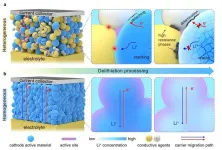(Press-News.org) Millions of Americans take anticoagulants, commonly known as blood thinners. These medications work to prevent blood clots that cause heart attack and stroke.
More than two-thirds of those people take a type of blood thinner called a direct oral anticoagulant. DOACs, such as rivaroxaban (brand name Xarelto) and apixaban (brand name Eliquis), are under- or over-prescribed in up to one in eight patents.
These prescribing issues can have life threatening consequences, and they most often occur after a provider writes the initial prescription, according to a study led by Michigan Medicine.
“Direct oral anticoagulants may be viewed as simpler to manage than traditional blood thinners, like warfarin, but our results highlight why providers need to be consistently monitoring anticoagulant medications before a patient experiences thrombotic or bleeding harms,” said Geoffrey Barnes, M.D., M.Sc., senior author and associate professor of cardiology-internal medicine at U-M Medical School.
At hospitals across Michigan, off-label dosing of DOACs was relatively common among patients being treated for atrial fibrillation and venous thromboembolism, when blood clots form in the veins.
Researchers evaluated five years of prescribing data from 2018-2022 through the Michigan Anticoagulant Improvement Initiative, a statewide quality improvement collaborative funded by Blue Cross Blue Shield and Blue Care Network of Michigan.
Nearly 70% of the alerts to off-label dosing occurred during a follow up visit compared to the time of the initial prescription, according to results published in Thrombosis and Haemostasis.
When prescribers were contacted about the dosing issue, they made changes three-quarters of the time.
However, only 18% of dosing alerts resulted in contact to a prescriber.
“While many clinical decision support tools are designed to ensure accurate medication dosing at the time of an initial prescription, few address the need for ongoing monitoring,” said first author Grace C. Herron, a fourth-year student at U-M Medical School.
“Any health system that aims to improve safe and effective DOAC prescribing must address the ongoing prescribing period which can last months to years.”
Direct oral anticoagulants became available in 2010 and quickly gained popularity because, unlike conventional blood thinners, they do not require routine monitoring to test their effectiveness.
However, these medications have their own complicated dosing schemes that can vary based on factors such as kidney function and select interactions between drugs.
“The hospital systems in the Michigan Anticoagulation Quality Improvement Initiative are leading national efforts to develop, implement and test anticoagulation stewardship teams that ensure patients are always receiving the safest and most appropriate blood thinner possible,” Barnes said.
“The nurses and pharmacists on these teams play a critical role in helping to monitor for any prescription issue that might develop, even months or years after a patient starts on a blood thinner medication.”
Additional authors: Deborah DeCamillo, R.N., B.S.N., Xiaowen Kong, M.A., Brian Haymart, R.N., M.S., James B. Froehlich, M.D., M.P.H., all of University of Michigan, Scott Kaatz, D.O., M.S.C., Stacy Ellsworth, R.N., M.S.N., both of Henry Ford Health, Mona A. Ali, Pharm.D., of Corewell Health William Beaumont University Hospital, and Christopher Giuliano, Pharm.D., M.P.H., of Wayne State University and Ascension St. John Hospital.
Funding: Funding for this study was provided by the Agency for Healthcare Research and Quality (R18HS026874). Blue Cross Blue Shield of Michigan and Blue Care Network provided funding for data abstraction and statistical analysis as part of the BCBSM Value Partnership program.
Disclaimer: Although Blue Cross Blue Shield of Michigan and the Michigan Anticoagulation Quality Improvement Initiative work collaboratively, the opinions, beliefs and viewpoints expressed by the authors do not necessarily reflect the opinions, beliefs, and viewpoints of BCBSM or any of its employees.
Paper Cited: “Timing of Off-Label Dosing of Direct Oral Anticoagulants in Three Large Health Systems,” Thrombosis and Haemostasis. DOI: 10.1055/a-2365-8681
END
Most blood thinner dosing problems happen after initial prescription
Over- or under-dosing anticoagulants can result in serious health conditions
2024-07-31
ELSE PRESS RELEASES FROM THIS DATE:
AI boosts the power of EEGs, enabling neurologists to quickly, precisely pinpoint signs of dementia
2024-07-31
ROCHESTER, Minn. — Mayo Clinic scientists are using artificial intelligence (AI) and machine learning to analyze electroencephalogram (EEG) tests more quickly and precisely, enabling neurologists to find early signs of dementia among data that typically go unexamined.
The century-old EEG, during which a dozen or more electrodes are stuck to the scalp to monitor brain activity, is often used to detect epilepsy. Its results are interpreted by neurologists and other experts trained to spot patterns among the test's squiggly waves.
In new research published in Brain Communications, scientists at the Mayo Clinic Neurology AI Program (NAIP) demonstrate ...
AI predicts male infertility risk with blood test, no semen needed
2024-07-31
According to a World Health Organization (WHO) study (2017), about half of all infertility is due to men. Semen analysis is considered essential for diagnosis of male infertility, but is not readily available at medical institutions other than those specializing in infertility treatment, and there is a high threshold for receiving it.
In this study, a group led by Associate Professor Hideyuki Kobayashi of the Department of Urology, Toho University School of Medicine, Tokyo, Japan developed an AI model that can predict the risk ...
Researchers pioneer new approach to enhance all-solid-state lithium batteries
2024-07-31
Researchers at the Qingdao Institute of Bioenergy and Bioprocess Technology (QIBEBT) of the Chinese Academy of Sciences, along with collaborators from leading international institutions, have introduced an innovative cathode homogenization strategy for all-solid-state lithium batteries (ASLBs).
This new approach, detailed in their recent publication in Nature Energy on July 31, significantly improves the cycle life and energy density of ASLBs, representing an important advancement in energy storage technology.
Current ASLBs face challenges due to heterogeneous composite cathodes, which require ...
Surprising finding in glioblastomas:
2024-07-31
Glioblastomas are highly aggressive, usually incurable brain tumors. If all therapeutic options are exhausted, patients have an average life expectancy of less than two years. Now researchers from the German Cancer Consortium (DKTK) at the West German Tumor Center Essen have made a surprising discovery: in the vicinity of glioblastomas, they found islands of highly potent immune cells in the neighboring bone marrow of the skull, which play a central role in defending against cancer. The new data may open up prospects ...
Blood proteins may help to track the pathological progression of Lewy’s body disease
2024-07-31
Early detection of Alzheimer’s disease-related changes in Parkinson's disease and dementia with Lewy bodies could be made possible by monitoring the amyloid-β (Aβ) and phosphorylated tau (p-tau) proteins. Researchers at Nagoya University in Japan also discovered the blood levels of neurofilament light chain (NfL) protein is elevated at an early stage of Parkinson's disease (PD) and dementia with Lewy bodies (DLB). This discovery may provide a method to identify potential patients and to make early interventions. The findings were published in npj Parkinson’s Disease.
The two forms of Lewy body disease are PD and DLB. ...
Pandemic exacerbated depression in older adults with diabetes
2024-07-31
TORONTO, ON – A recent study of more than 2,700 older Canadians reported older adults with diabetes faced a heightened risk of depression during the COVID-19 pandemic. In this cohort, almost 50% of those who had a pre-pandemic history of depression experienced depression during the pandemic.
Those who experienced loneliness were among the most impacted.
“During the pandemic, loneliness almost tripled the risk of depression in older adults with diabetes,” says clinical pharmacist and first author ZhiDi Deng. “This not only highlights ...
AI opens door to safe, effective new antibiotics to combat resistant bacteria
2024-07-31
In a hopeful sign for demand for more safe, effective antibiotics for humans, researchers at The University of Texas at Austin have leveraged artificial intelligence to develop a new drug that already is showing promise in animal trials.
Publishing their results in Nature Biomedical Engineering, the scientists describe using a large language model—an AI tool like the one that powers ChatGPT—to engineer a version of a bacteria-killing drug that was previously toxic in humans, so that it would be safe to use.
The prognosis for patients ...
Study finds many cocoa products contaminated by heavy metals
2024-07-31
For Embargoed Release: July 31, 2024 at 3:00 am ET USA
Media Contact: Katelyn Deckelbaum, katelyn.deckelbaum@gwu.edu and Kathy Fackelmann, kfackelmann@gwu.edu
Study Finds Many Cocoa Products Contaminated by Heavy Metals
Dark chocolate lovers may want to limit their consumption to an ounce a day to stay on the safe side, according to the authors
WASHINGTON (July 24, 2024) - A new study from George Washington University found a disquieting percentage of cocoa products in the U.S. contain heavy metals that exceed guidelines, including higher concentrations in organic products.
GW researchers analyzed ...
Monarch butterflies need help, and a little bit of milkweed goes a long way
2024-07-31
Monarch butterflies, with their striking orange and black wings, are some of the most recognizable butterflies in North America. But they're in trouble. Monarch caterpillars can only eat the leaves of milkweed, a native wildflower. As milkweed has disappeared, so have the monarchs, to the point that they're at risk of extinction. Research shows that planting milkweed in home gardens can add significant monarch habitat to the landscape. In a new study in the journal Frontiers in Ecology and Evolution, ...
Newly discovered sheets of nanoscale “cubes” make excellent catalysts
2024-07-31
Tokyo, Japan – Researchers from Tokyo Metropolitan University have created sheets of transition metal chalcogenide “cubes” connected by chlorine atoms. While sheets of atoms have been widely studied e.g. graphene, the team’s work breaks new ground by using clusters instead. The team succeeded in forming nanoribbons inside carbon nanotubes for structural characterization, while also forming microscale sheets of cubes which could be exfoliated and probed. These were shown to be an excellent catalyst for generating hydrogen.
Two-dimensional materials are a breakthrough in nanotechnology, realizing ...
LAST 30 PRESS RELEASES:
Next-generation CAR-T designs that could transform cancer treatment
As health care goes digital, patients are being left behind
A clinicopathologic analysis of 740 endometrial polyps: risk of premalignant changes and malignancy
Gibson Oncology, NIH to begin Phase 2 trials of LMP744 for treatment of first-time recurrent glioblastoma
Researchers develop a high-efficiency photocatalyst using iron instead of rare metals
Study finds no evidence of persistent tick-borne infection in people who link chronic illness to ticks
New system tracks blockchain money laundering faster and more accurately
In vitro antibacterial activity of crude extracts from Tithonia diversifolia (asteraceae) and Solanum torvum (solanaceae) against selected shigella species
Qiliang (Andy) Ding, PhD, named recipient of the 2026 ACMG Foundation Rising Scholar Trainee Award
Heat-free gas sensing: LED-driven electronic nose technology enhances multi-gas detection
Women more likely to choose wine from female winemakers
E-waste chemicals are appearing in dolphins and porpoises
Researchers warn: opioids aren’t effective for many acute pain conditions
Largest image of its kind shows hidden chemistry at the heart of the Milky Way
JBNU researchers review advances in pyrochlore oxide-based dielectric energy storage technology
Novel cellular phenomenon reveals how immune cells extract nuclear DNA from dying cells
Printable enzyme ink powers next-generation wearable biosensors
6 in 10 US women projected to have at least one type of cardiovascular disease by 2050
People’s gut bacteria worse in areas with higher social deprivation
Unique analysis shows air-con heat relief significantly worsens climate change
Keto diet may restore exercise benefits in people with high blood sugar
Manchester researchers challenge misleading language around plastic waste solutions
Vessel traffic alters behavior, stress and population trends of marine megafauna
Your car’s tire sensors could be used to track you
Research confirms that ocean warming causes an annual decline in fish biomass of up to 19.8%
Local water supply crucial to success of hydrogen initiative in Europe
New blood test score detects hidden alcohol-related liver disease
High risk of readmission and death among heart failure patients
Code for Earth launches 2026 climate and weather data challenges
Three women named Britain’s Brightest Young Scientists, each winning ‘unrestricted’ £100,000 Blavatnik Awards prize
[Press-News.org] Most blood thinner dosing problems happen after initial prescriptionOver- or under-dosing anticoagulants can result in serious health conditions





